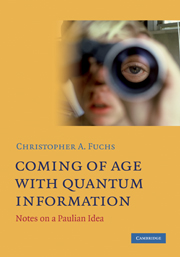Book contents
- Frontmatter
- Contents
- Foreword
- Introduction to the Cambridge University Press Edition
- Introduction to the Original ArXiv.org Posting
- Disclaimers
- Acknowledgements
- 1 Letters to David Baker
- 2 Letters to Howard Baker
- 3 Letters to Howard Barnum
- 4 Letters to Paul Benioff
- 5 Letters to Charlie Bennett
- 6 Letters to Herb Bernstein
- 7 Letters to Doug Bilodeau
- 8 Letters to Gilles Brassard
- 9 Letters to Jeffrey Bub
- 10 Letters to Carlton Caves
- 11 Letters to Greg Comer
- 12 Letters to Charles Enz
- 13 Letters to Henry Folse
- 14 Letters to Bob Griffiths
- 15 Letters to Adrian Kent
- 16 Letters to Rolf Landauer
- 17 Letters to Hideo Mabuchi
- 18 Letters to David Mermin
- 19 Letters to David Meyer
- 20 Letters to Jeff Nicholson
- 21 Letters to Michael Nielsen
- 22 Letters to Asher Peres
- 23 Diary of a Carefully Worded Paper: More Letters to Asher Peres
- 24 Letters to John Preskill
- 25 Letters to Joseph Renes
- 26 Letters to Mary Beth Ruskai
- 27 Letters to Rüdiger Schack
- 28 Letters to Robert Schumann
- 29 Letters to Abner Shimony
- 30 Letters to Jon Waskan
- 31 Letters to Bill Wootters
- 32 Letters to Anton Zeilinger
- 33 Other Letters
- Postpartum
- Index of Names
3 - Letters to Howard Barnum
Published online by Cambridge University Press: 05 October 2012
- Frontmatter
- Contents
- Foreword
- Introduction to the Cambridge University Press Edition
- Introduction to the Original ArXiv.org Posting
- Disclaimers
- Acknowledgements
- 1 Letters to David Baker
- 2 Letters to Howard Baker
- 3 Letters to Howard Barnum
- 4 Letters to Paul Benioff
- 5 Letters to Charlie Bennett
- 6 Letters to Herb Bernstein
- 7 Letters to Doug Bilodeau
- 8 Letters to Gilles Brassard
- 9 Letters to Jeffrey Bub
- 10 Letters to Carlton Caves
- 11 Letters to Greg Comer
- 12 Letters to Charles Enz
- 13 Letters to Henry Folse
- 14 Letters to Bob Griffiths
- 15 Letters to Adrian Kent
- 16 Letters to Rolf Landauer
- 17 Letters to Hideo Mabuchi
- 18 Letters to David Mermin
- 19 Letters to David Meyer
- 20 Letters to Jeff Nicholson
- 21 Letters to Michael Nielsen
- 22 Letters to Asher Peres
- 23 Diary of a Carefully Worded Paper: More Letters to Asher Peres
- 24 Letters to John Preskill
- 25 Letters to Joseph Renes
- 26 Letters to Mary Beth Ruskai
- 27 Letters to Rüdiger Schack
- 28 Letters to Robert Schumann
- 29 Letters to Abner Shimony
- 30 Letters to Jon Waskan
- 31 Letters to Bill Wootters
- 32 Letters to Anton Zeilinger
- 33 Other Letters
- Postpartum
- Index of Names
Summary
02 June 1999, “Please Do”
You know what I'm really trying to get at here: I want the structure of quantum mechanics to be extremal for some kind of more abstract (i.e., QM-independent) information-disturbance problem. But the first thing that needs to be done is to pin down what quantum mechanics itself has to say.
Another thing that keeps coming to mind is that the assumptions behind Gleason's theorem might have something to do with the allegory I presented you with at Charlie and Theo's house. God said, “Ok I will make information gathering invasive, but not so invasive that you will be forever science-less.” The connection is this. I think one can split the assumption behind Gleason up into at least two parts: (1) The questions that can be asked of a quantum system only correspond to orthonormal bases over some vector space, with there being no good notion of measuring two distinct questions simultaneously (there being no good notion of an AND operation). And (2) It is the task of physical theory to give probabilities for the outcomes of those questions, but we can say at least this much about the probabilities. They are context-independent in the sense that, for a given outcome, it does not matter which physical question (which basis) we've associated it with. I.e., the probabilities can be assumed to be of the form of a frame function.
- Type
- Chapter
- Information
- Coming of Age With Quantum InformationNotes on a Paulian Idea, pp. 20 - 27Publisher: Cambridge University PressPrint publication year: 2011



